Beaten by their own tax: French citizens demand justice for police violence Batons and brutality
“I have never seen or endured such violence”: Victims of French police brutality during the "Yellow Vest" protests demand accountability.
During street protests, nearly three thousand people sustained injuries, many of whom were left disabled. There are calls for disciplinary action against police special forces suspected of unjustified violence. The police, however, claim they have been unfairly blamed.
The Battle of Wagram-2
In early August, the Paris prosecutor’s office called for a judicial review of nine CRS (special mobile French police force) officers accused of abuse of power during the brutal dispersal of a "Yellow Vest" demonstration on December 1, 2018, near the Champs-Élysées.
This episode of unprovoked police violence might have gone unpunished, like countless others, if not for the graphic video footage capturing the brutality in full detail. The images of police officers indiscriminately wielding batons sparked widespread outrage across French society. Journalists were also among those injured during the police crackdown.
On that day, intense clashes erupted between protesters and the CRS unit dispatched to break up the demonstration. Ultimately, the police succeeded in dispersing the protesters. Later, a group of yellow vests was encountered by police at a Burger King on Avenue de Wagram. The subsequent events were extensively documented on video by several reporters and bystanders.
Nous venons d'apprendre que le parquet de Paris requiert le renvoi en correctionnelle de 9 CRS pour les violences dans le #BurgerKing pour lesquelles mes clients avaient déposé plainte il y a 6 ans. C'est long, mais tout arrive. Beaucoup d'autres poursuites à venir #GiletsJaunes pic.twitter.com/tC6WDbSMhI
— Arié Alimi Avocats (@AA_Avocats) August 1, 2024
Police with shields and batons storm into a fast-food restaurant, attacking the "Yellow Vest" protesters inside. One protester lies on his back when a police officer approaches and begins beating him with a baton. Another already injured protester is sprawled on the floor, nearly motionless.
Despite this, two special forces officers return to him and resume hitting him with rubber sticks. The victim, unable to defend himself, jerks his body in response to the blows. The police, however, are not satisfied. They come back a third time, using their batons to "revive" the injured man, forcing him to stand up and run.
Similar treatment is meted out to other victims. Additionally, in a neighboring area, police continue their assault on other people lying on the floor. The footage also shows a "Yellow Vest" protester being struck in the head with a police baton as he is pushed through the line.
It should be noted that not all yellow vests are model citizens, and some may not fit the image of Sunday school students. Perhaps they entered the Burger King, which, like McDonald's, is viewed as a symbol of exploitative global capitalism, not merely to grab a bite? This might suggest that the police were justified in their actions.
However, regardless of their motives, at the time of the assault, these individuals were not engaging in violent behavior or resisting the police. Therefore, the use of force against them was unjustified according to police procedures and resembled a punitive execution rather than a legitimate response.
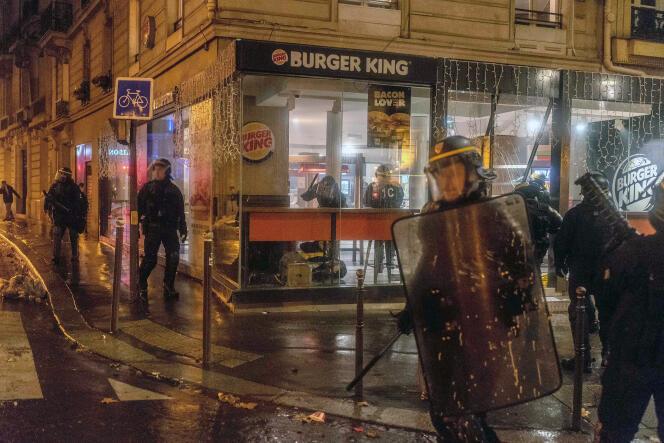
On that day, France was experiencing the third wave of "Yellow Vest" protests against the decline in purchasing power, or more simply, the growing poverty among many French citizens. The confrontation between protesters and police was exceptionally intense. According to the Ministry of the Interior, the protests drew 136,000 people across France. The Champs-Élysées was closed off from the morning, and 4,000 special mobile police were deployed.
Nevertheless, unrest also spread to Boulevard Haussmann, Rue de Rivoli, the Place de l'Opéra, and other central locations. The police used tear gas and water cannons to push demonstrators away from the Arc de Triomphe. Amid the protests, numerous radicals and criminal elements joined in, leading to widespread vandalism. The "Yellow Vests" themselves could no longer control the situation. On that day, 412 people were arrested, 133 were injured, with the majority of the casualties being civilians.
Taxpayers beaten with their own money
The investigation into the Burger King incident was initiated relatively swiftly, but it took nearly six years for the full extent of the serious crime on Wagram Street to be acknowledged. On July 31, 2024, the Paris Prosecutor's Office called for the dismissal of the suspects from the police force, and on August 2, they sought to have them prosecuted.
The prosecution is demanding that nine CRS officers face criminal court charges for intentional violence under aggravating circumstances by a person wielding state power. Two of the officers are accused of committing this crime with the use of weapons. The victims included at least four "Yellow Vests" and one journalist.
The lengthy investigation revealed the following details. The indictment describes the victims as "non-hostile demonstrators." Prior to the incident, the fast-food restaurant did suffer an attack, but this was carried out by other individuals.
The peaceful "Yellow Vests" who were beaten by police had entered the restaurant through already broken doors, seeking refuge from police forces that were pushing demonstrators off the street. The prosecution emphasized that the victims were either lying on their backs or trying to retreat with their hands raised. The investigation also suggested that the violence continued even after they were outside.
The beatings inflicted were quite severe—six of the victims were temporarily rendered completely incapacitated. Investigators found that one demonstrator, Nathan A., lying on the floor, received 27 baton strikes from a group of six police officers. It was also determined that a journalist, despite being identified as a member of the press, was among those subjected to police violence.
Manon, a 28-year-old, recounted to the media that she and her friend Max were leaving the demonstration when they were caught in a dense cloud of tear gas. Manon began to struggle for breath, while Max experienced severe vomiting. After narrowly escaping the toxic cloud, the pair decided to seek refuge in a Burger King. Along with other protesters, many journalists also took shelter there. Soon after, enraged CRS officers stormed the restaurant and began indiscriminately assaulting people. Manon sustained a serious arm injury, which continued to cause pain a year later.
"I have never witnessed or experienced such violence," Manon said. She also believed that the police should have been protecting the demonstration from troublemakers rather than assaulting peaceful participants, especially considering that taxpayers, including herself, fund the French police.
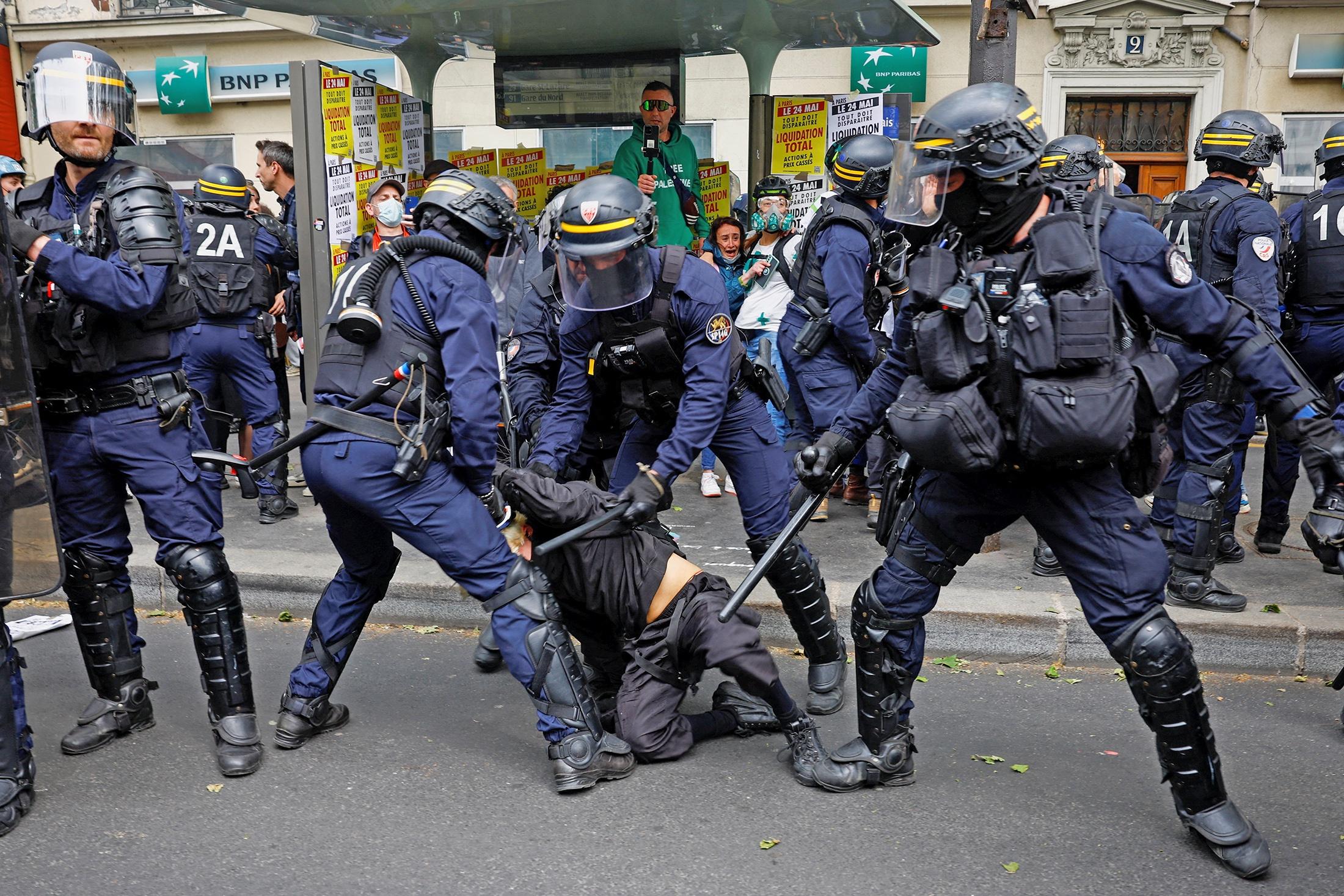
French police: fighting for their rights
However, there is another side to the story. Police officers themselves have voiced grievances about the working conditions they face, as they too are employees and belong to their own unions.
"The situation was unprecedented in its scale," Stanislas Godon, the national secretary of the police union, remarked at the time.
The officers now facing investigation and court proceedings claim they were severely overworked, having spent 13 consecutive hours dealing with the riots. According to them, they were instructed by their superiors to clear the Burger King of looters swiftly, without detaining anyone.
The accused officers also assert that the "yellow vests" were allegedly lying on the floor, refusing to leave the restaurant. However, the investigation is skeptical of these justifications. The footage clearly shows that the victims were not on the floor out of protest but were subjected to a barrage of baton strikes. The police were seen hitting even those attempting to exit the establishment.
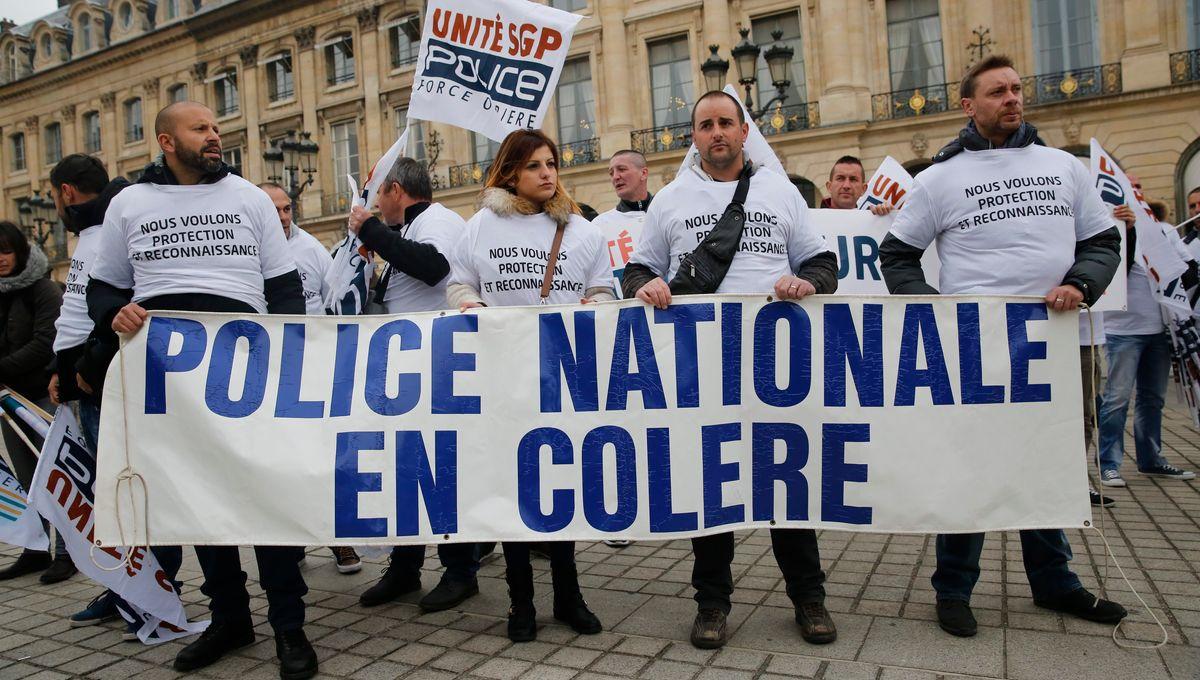
“I feel as though I am being judged solely for these three minutes,” states the commander of the 1st Squad of the 43rd Regiment (CRS 43) of the Chalon-sur-Saône Companies for Republican Security, who was deployed on Rue Wagram that day. The captain contends that he and his team should have refused to execute what he now considers an erroneous order. He asserts that despite his full-day effort to uphold the Republic's defence, his actions during those critical moments are under scrutiny, overshadowing his overall service.
During the events, both the police union and the National Police Commissioners’ Union proposed declaring a state of emergency to end the violence. Police unions complain that their members have been required to work overtime during operations against the “yellow vests” and similar protests, enduring significant physical and psychological strain. Many officers sustain injuries and feel inadequately protected by the law. Meanwhile, the protesters are perceived as not facing sufficient consequences. CRS special forces officers under investigation now face potential prison sentences of up to five years.
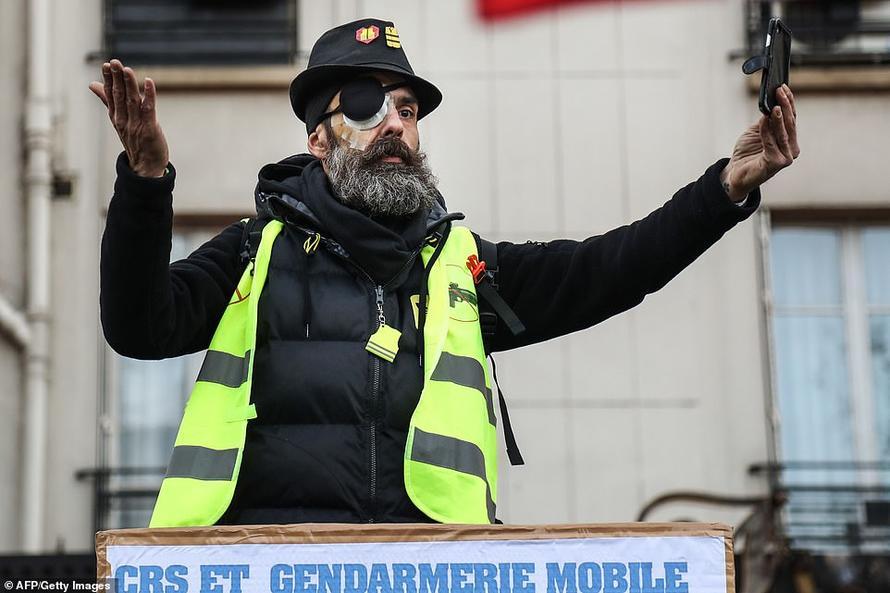
A direct hit
During the "Yellow Vest" protests, 11 individuals lost their lives, with at least 30 demonstrators suffering eye injuries and five losing their arms. In total, 2,891 people were injured, the majority of whom were protesters. Notably, Jerome Rodrigues, one of the movement's leaders, lost an eye due to a targeted shot.
Rodrigues later remarked: "I want to tell you, and all the people who have supported me over the past two years today: Macron’s police gouged out my eye."
Another demonstrator was injured by the same shot. While the officers responsible for Rodrigues' injury faced legal consequences, many other similar cases did not.
Most fatalities during the "Yellow Vest" revolution resulted from vehicular attacks. President Macron claimed that the police were not involved in any of these deaths. However, Macron's statement was misleading. On December 1, 2018, the same day as the Wagram street beatings, an 80-year-old woman named Zineb Redouane in Marseille was struck in the face by a tear gas grenade. She died the following day. Although she was not a protester but simply closing her shutters on the fourth floor of her apartment, she managed to convey before being transported to the hospital that the police officer on the street had deliberately aimed at her.
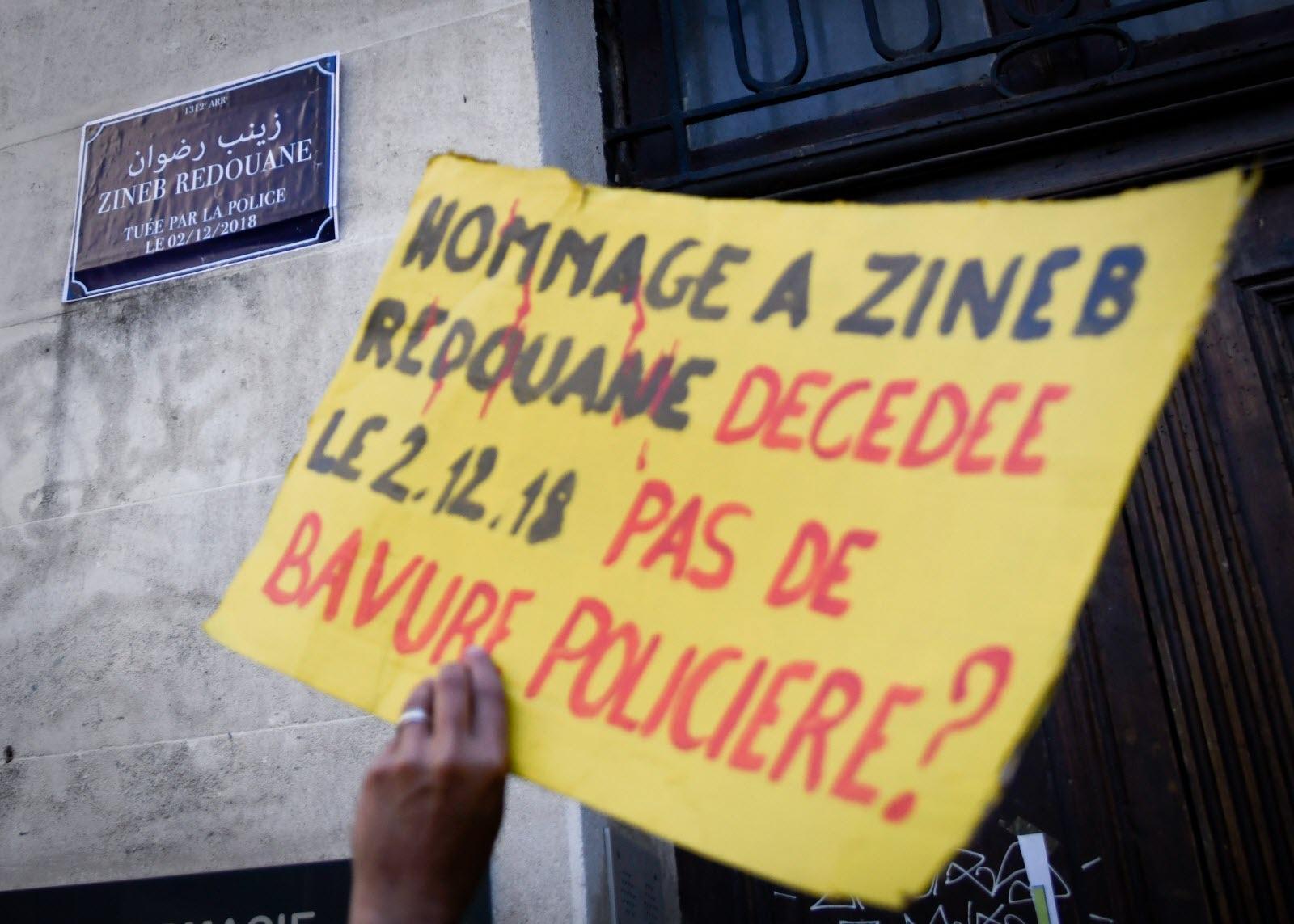
The cause of this death, along with numerous severe injuries, was the use of the 40mm grenade launchers grenade launcher by the police. Essentially a combat weapon, the grenade launchers fires 40mm rubber bullets at a velocity of 85 meters per second. A direct hit to the head or other vulnerable areas from such a projectile can result in death or severe injury. Witnesses report that police intentionally aimed these grenades at the faces of protesters.
Initially, French authorities denied the use of 40mm grenade launchers, but photographic and video evidence later proved otherwise. Human rights advocates petitioned for a ban on this weapon, but in February 2019, the French Council of State rejected the request.
Additionally, various injuries and one fatality were attributed to the use of specialized flashbang and tear gas grenades, which can cause significant harm from direct hits or shrapnel upon explosion.
Many view the French police as one of the most forceful, if not the most brutal, among the "old" EU countries. This perception may stem from the fact that, for example, their German counterparts operate under a different paradigm following the denazification of Germany. The policing in Spain and Italy also functions under different conditions today. In France, however, the traditions of a strong "Jacobian" state remain deeply entrenched. On the other hand, French police continue to contend with armed and aggressive gangs, and crime in France persists in rising, often leading various crime statistics in the EU.
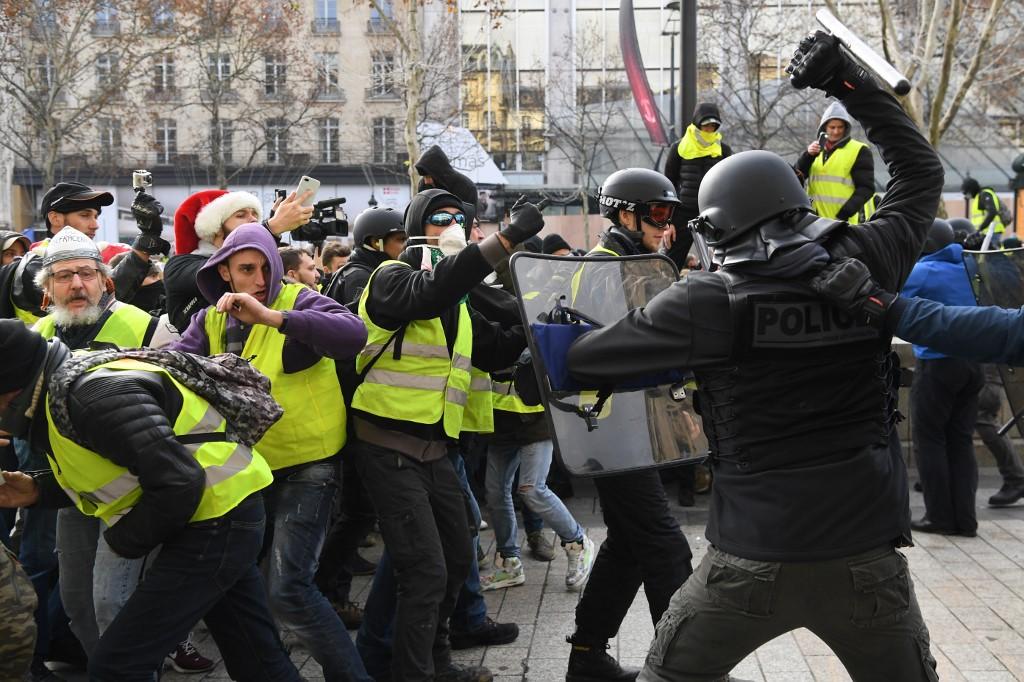
France’s leadership in both the severity of socio-political protests and criminal activity under President Macron primarily reflects the country's profound internal contradictions. Historically, Napoleon Bonaparte defeated the Austrians at Wagram with a powerful assault from his army, which was fanatically loyal to the emperor.
Today, however, fewer French people place their trust in President Macron. Instead of focusing on police repression within the Republic, pursuing grand "Napoleonic" plans abroad, or heeding the lessons from other democracies, French authorities should concentrate on addressing their own domestic issues. This includes improving the standard of living for their citizens and effectively safeguarding their social and civil rights...








